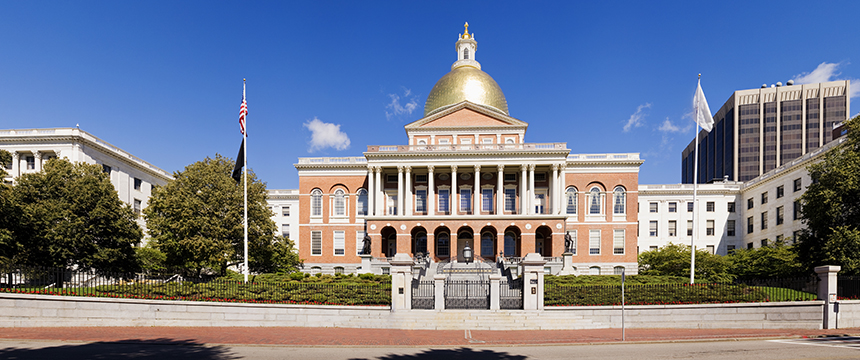
Massachusetts Governor Charlie Baker has restarted the discussion on health care cost containment in the Commonwealth with a proposed bill that contains a raft of initiatives. This is the first in a series of blog posts to invite discussion and testing of the proposals.
Click HERE to read about the Proposed Facility Fee Ban.
Click HERE to read about the MA Proposed Reporting Requirements for Drug Pricing Transparency.
Background
Massachusetts Governor Charlie Baker introduced a bill designed to (among a number of other “cost containment” provisions) restrict off-campus “Facility Fee” billing in the Commonwealth. This proposal goes far beyond the federal Medicare limitations under Section 603 of the Bipartisan Budget Act of 2015 that we have covered here extensively or the Centers for Medicare and Medicaid Services (CMS) site neutrality regulation, which was recently struck down by a Federal District Court for being beyond CMS’ authority under federal law. For this reason, it is important for providers to understand what the Governor has proposed when evaluating the many components of his bill. Hospitals outside of the Commonwealth should also pay attention to developments, as the country often looks to Massachusetts, the state that developed “Romney Care” the predecessor to “Obama Care,” as it now grapples with how to manage cost containment in an era of expanded access to health care coverage.
Facility Fee Ban
In general, the Governor’s proposal includes an absolute ban on reimbursement for hospital facility fees rendered in (initially) off-campus locations, other than emergency departments. If enacted, only professional fees may be billed in such locations, with hospitals and other health care providers subject to covering all the costs of overhead for these facilities without any reimbursement, other than (it appears) through federal and employer-sponsored plans. It is curious what other sources of revenue hospitals will be able to access to cover the overhead of these community resources without the ability to bill third-party payors. While policymakers may believe that these hospital facilities could simply convert to freestanding medical offices, it seems foreseeable that the result would be closure of many of these facilities that are not sustainable with their case and payor mix reimbursed on professional fees only. Patients would be required to travel back to the main campus of the hospital for needed services, causing access problems for many of the most vulnerable populations, particularly in remote or rural locations.
Here is a summary of what the Governor’s proposal would do, along with some of the consequences (intended or unintended).
What is a Facility Fee?
The bill adds a new section to the health care facility law (Chapter 111), applicable to any health care provider, not just hospitals. “Facility fees” are defined broadly, not just based on APC or revenue codes. The definition of a “facility fee” is “a fee charged, billed or collected by a health care provider for hospital services provided in a facility that is owned or operated, in whole or in part, by a hospital or health system that is intended to compensate the health care provider for operational expenses and is separate and distinct from a professional fee.”
- Foley Commentary: It is likely that the ban was intended to target only outpatient services (as with the Medicare payment limitations), but the bill is not explicitly so limited. To the extent there are facility fees billed for inpatient services off the main campus, they may be technically impacted as the bill is written.
- We hope that the Administration’s intention is not to prohibit charging for ambulatory surgery center (ASC) services when the ASC is operated by a hospital or health system. However, ASCs are potentially captured in the broad definition, as well as other technical fees (lab, x-ray, etc.) associated with a visit.
- It appears that the prohibition in the statute would be payor-agnostic, which raises interesting constitutional questions about whether the Commonwealth is permitted to interfere with the payment and reimbursement structures of the federal Medicare and other programs. Federal preemption analysis will need to be conducted to assure that hospitals may comply with Medicare “split bill” requirements.
Where are Providers Prohibited from Charging Facility Fees?
Health care providers (again, not limited to hospitals) would be prohibited from charging any facility fees except for (1) services provided “on campus” (using the Medicare definition of 250 yards from the main buildings), (2) services provided in a facility that includes a licensed hospital emergency department, or (3) emergency services provided at a licensed satellite emergency facility.
- Foley Commentary: The bill contains no “grandfathering” of existing off-campus facilities. Congress in Section 603 only applied the payment limitation to new off-campus facilities, billing Medicare under the Outpatient Prospective Payment System after November 2, 2015. In addition, the protection for off-campus emergency departments is more restrictive than the similar Medicare protection, which is tied to facilities subject to EMTALA, the Emergency Medical Treatment and Labor Act, whether or not licensed as an emergency department.
- Unlike the Medicare site-neutrality provision, which permits billing for facility fees, but reduces payment to 40% of OPPS, the Massachusetts bill would prohibit any reimbursement for facility fees. In other words, this is not “site neutrality,” this is a ban on facility fee billing.
- If health care providers may only bill professional fees, then there is a real question about whether the physicians and other practitioners will have to enter into agreements with health care providers to compensate the hospital for the physician/practitioner’s use of the hospital’s space and overhead. This was a concern explicitly raised in the Proposed Rule that contemplated a “transitional model” for Section 603, which CMS ultimately rejected by continuing to permit hospitals to bill Medicare at a reduced rate. The Governor’s plan potentially creates financial relationships with physicians (and other professionals) and the hospitals where they perform services that require compliance with the Physician Self-Referral or “Stark” Law. We believe that this is an unanticipated consequence of the bill, and one that the Administration should carefully consider.
HPC Discretion to Extend Facility fee Prohibition
The proposed bill gives the Health Policy Commission the power to extend the facility fee prohibition to outpatient services at on-campus facilities if the HPC finds that a service “may reliably be provided safely and effectively in settings other than hospitals.” The bill contemplates that these services will be extremely broad, including evaluation and management services and diagnostic imaging.
- Foley Commentary: This opens the door to both on and off-campus payment prohibitions, and mirrors some actions that commercial payors (like United Health Care and others) have recently implemented for what might be viewed as “financial medical necessity” denials.
Providers Must Notify Patients of Facility Fee Billing
Health care providers may be required to provide extensive written patient notifications of facility fee billing, both on and off-campus. For scheduled appointments more than 10 days out, these notices must be provided in advance of the service.
- Foley Commentary: CMS regulations already require an extensive “notice of beneficiary co-insurance liability” be provided to patients in off-campus locations. The Massachusetts rule would go well beyond the Medicare requirements. The State should seek to harmonize any new notice requirement with the similar federal notices, or indicate that the Medicare notice is sufficient.
Insurers Prohibited from Paying For Prohibited Facility Fees
As if the statutory billing prohibition were insufficient, the bill also mandates that health insurers, including HMOs, PPOs, Blue Cross and Blue Shield, as well as the Group Insurance Commission not pay for a prohibited facility fee, and invites further cuts by the payors beyond the ban in the law.
- Foley Commentary: This may have been added in anticipation of legislative negotiations on the broader facility fee billing ban.
FCA Liability and Fines Possible for Violations of Facility Fee Ban
Finally, the bill adds language to the state False Claims Act (FCA) that would tee up a potential FCA violation for receiving a prohibited facility fee payment or presenting a prohibited facility fee for payment. This addition exposes a hospital to refund the full amount of the benefit or payment made, and for reasonable attorneys’ fees and costs, inclusive of costs of investigation.
In addition to fees under the amended state FCA, providers who violate the facility fee ban may be punished by a fine of not more than $1,000 per occurrence.
Providers and insurers alike should take careful note of the Governor’s proposed bill, as the facility fee ban would have serious implications on provider reimbursement. In addition to the facility fee prohibition, the bill would require providers and insurers to spend 30% more on primary and behavioral health care, impose restrictions on surprise billing, increase coverage of telehealth and behavioral health services, and implement drug pricing provisions. Foley will cover the bill’s key initiatives in subsequent Health Care Law Today posts.




